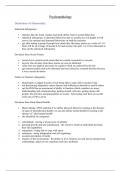Summary
Summary Minority influence (social influence) with evaluation
- Course
- Institution
- Book
Minority influence content, concise summary and evaluation paragraphs. These documents are all the notes that I made in my 2 years studying A level psychology. I achieved a grade A for psychology. And I credit it to all the hard work I poured into these notes, which took years to perfect. I am ext...
[Show more]



